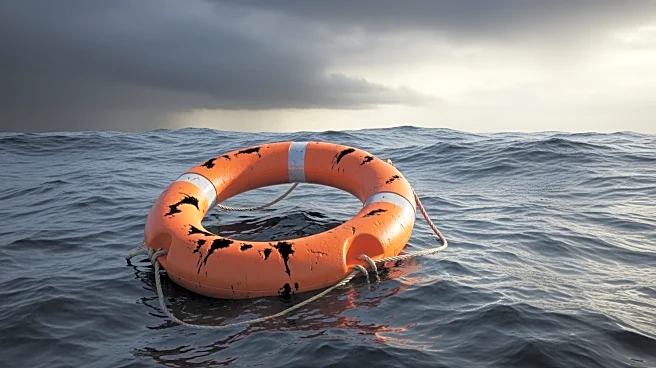What's Happening?
A migrant vessel carrying approximately 300 people sank near the Malaysia-Thailand border, leaving hundreds missing. The boat, which departed from Buthidaung, Myanmar, was carrying members of the Rohingya
minority and other migrants. Survivors found in the waters off Langkawi included three Myanmar men, two Rohingya men, and one Bangladeshi man, while the body of a Rohingya woman was recovered. The migrants initially boarded a large vessel but were instructed to transfer to three smaller boats to avoid detection by authorities. The status of the other two boats remains unknown, and search-and-rescue operations are ongoing.
Why It's Important?
The sinking of the migrant vessel highlights the ongoing plight of the Rohingya minority, who face persecution in Myanmar and are often forced to flee in dangerous conditions. This incident underscores the broader refugee crisis affecting Southeast Asia, where migrants risk their lives to escape violence and seek asylum. The event may prompt international attention and calls for more robust measures to protect vulnerable populations and address the root causes of forced migration. It also raises concerns about the safety and treatment of refugees in transit and the need for coordinated regional responses.
What's Next?
Search-and-rescue operations continue as authorities attempt to locate the missing individuals and determine the fate of the other two boats. The incident may lead to increased scrutiny of regional migration policies and pressure on governments to improve safety measures for refugees. Humanitarian organizations may mobilize to provide aid and support to survivors and affected families. Additionally, there could be diplomatic discussions aimed at addressing the conditions in Myanmar that lead to such perilous journeys.
Beyond the Headlines
The tragedy may spark discussions on the ethical responsibilities of nations in handling refugee crises and the legal obligations to protect asylum seekers. It could also influence long-term policy shifts towards more humane and comprehensive migration strategies. The cultural dimensions of the Rohingya's struggle for recognition and rights in Myanmar may gain further international attention, potentially influencing global human rights advocacy.










